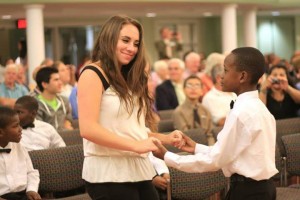Welcoming New Members!
October 16, 2013 by caplover
Welcome to a new school year with the Vassar Haiti Project! We’ve had a busy and fruitful autumn. This September, our ears were graced with the musical stylings of Les Petits Chanteurs, the talented Haitian boys choir, who visited us at Vassar during their East Coast tour. Furthermore, this month we had the opportunity to marvel at our paintings hung side-by-side with stained glass windows at our Haiti Cherie fundraiser, hosted by New York’s All Saints Episcopal Church.
A Vassar student interacts with a “petit chanteur,” 9.20.13
One of the most exciting things about the start of the new year, though, has been welcoming new student members. First years and upperclassmen alike have joined our ranks, and brought with them an unprecedented level of enthusiasm. One such new member is Simeon Busano ’16, who was kind enough to discuss his motivation for getting involved with the project, and to describe his experience thus far:
“The first time I ever considered Haiti was in 2010 during the earthquake. I was a journalist for my high school newspaper and I yearned to delve into hard-hitting stuff instead of the fluff pieces and poorly written editorials that cluttered the paper at that moment. As luck would have it, a Haitian boy had just recently transferred to my high school and so I set off to hunt him down and exploit him as a primary source and insert quotes of his into my piece every so often. Interestingly, his narrative was not of a squalid and forgotten corner of the world, but of a place bustling with promise, beleaguered by Western imperialism and drowning in inequality. Haiti was complex and changing and alive, even before the Western gaze turned to it following the devastating earthquake. And this fact disconcerted and disturbed me, because I realized he was right.
Becoming involved with Vassar Haiti Project was an easy choice for me. As an international student, a member of the African diaspora community, and someone with an interest in intra-and international issues of equality, it was all too convenient that VHP existed. The organization not only deals with global relations and power structures between intranational groups of the global North and the global South, namely Vassar College and a rural village in the northern Haitian mountainside, but also attracts a large number of international students also. Because the organization is run democratically, the plurality of backgrounds and cultural values helps the organization come to solutions that it mightn’t have had their been a single, majority opinion. Even more refreshing is the absence of hegemonic dissonance and condescension in dealing with the Haitians. Going back my anecdote, I wanted to illustrate the ways in which Western bodies interaction with non-Western spaces and people, which is so often privileged. We pity them; we feel we have the obligation to patronize them, as though these people were inferior to us, as though they didn’t have the intellectual capital to support themselves. All of the reasons I love Vassar Haiti Project is because it isn’t that. There is a respect and mutualism supported both by Lila and Andrew and the leadership of the Haitian village. There is an understanding that the efforts to improve the village must be concerted ones undertaken by partners, and not solely Westerners with a saviour complex.
In the short time I’ve been involved with the organization, I’ve learned about the the many initiatives being undertaken which encompass every aspect of life, from sanitation infrastructure to the enfranchisement of women and female bodied persons. I’ve helped set up chairs, and carry instruments, and collect name tags, and meet a group of immensely talent boys, all in preparation for a night of concert for the reconstruction of their school destroyed in Port-au-Prince. I’ve loaded artwork into a van, and helped take it out. I’ve written my name across a shelf in a little room on the third floor of Main Building. And, in all that work, I’ve contributed, in some small way, to an idea, or a hope that one day all people, regardless of the spaces into which they were born, will have full autonomy over themselves and their lives.”


